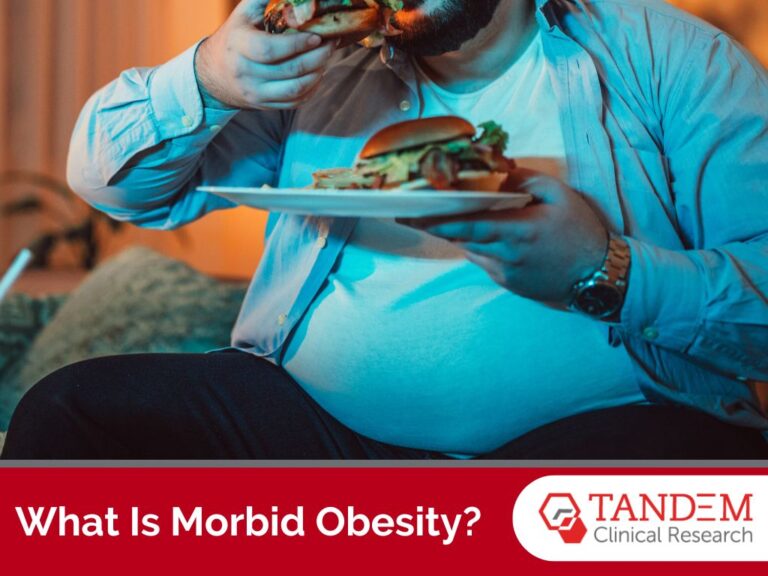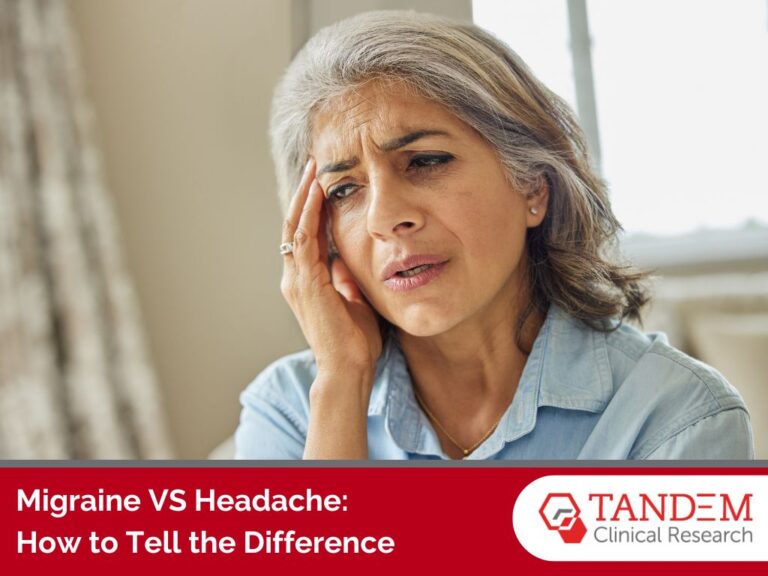Tandem Clinical Research Is a Dedicated Phase I-IV Clinical Trials Network
We specialize in the performance of clinical trials for pharmaceutical, biotech, and medical device companies.
All medical service is provided free of charge by board-certified physicians.
Click an image below to learn more.
How Do Clinical Trials Work?
Clinical trials are a crucial part of clinical research that test new medical treatments, drugs, or interventions on human participants to determine their safety and effectiveness. Here’s how they work:
- Study Design: Before a clinical trial begins, researchers carefully plan and design the study. They define the objectives, eligibility criteria for participants, and the treatment plan. This design ensures that the trial produces reliable and meaningful results.
- Phases of Clinical Trials: Clinical trials are typically conducted in multiple phases:
a. Phase 1: These trials involve a small number of healthy volunteers to assess the treatment’s safety, dosage, and potential side effects.
b. Phase 2: In this stage, the treatment is given to a larger group of patients who have the specific condition the treatment aims to address. Researchers monitor its effectiveness and further evaluate its safety.
c. Phase 3: The treatment is tested on an even larger group of patients to compare its effectiveness against existing standard treatments or placebos. This phase provides more comprehensive data on safety and efficacy.
d. Phase 4: After the treatment receives regulatory approval, Phase 4 trials are conducted to monitor its long-term safety and effectiveness in a broader population. - Randomization: Participants are randomly assigned to different groups. For example, in a Phase 3 trial, some participants might receive the new treatment while others receive the standard treatment or a placebo. This randomization helps minimize bias and ensures fair comparisons.
- Blinding (Masking): Blinding means that participants and/or researchers may not know which treatment each participant is receiving. This prevents bias and helps obtain more objective results. Trials can be single-blind (participants don’t know), double-blind (neither participants nor researchers know), or open-label (both know).
- Informed Consent: Before joining a clinical trial, participants must receive detailed information about the study, including potential risks and benefits. They give their informed consent to participate voluntarily.
- Monitoring and Data Collection: Throughout the trial, researchers closely monitor participants’ health and collect data on their responses to the treatment. This includes regular check-ups, tests, and questionnaires.
- Analysis and Results: After the trial is completed, researchers analyze the data to determine the treatment’s effectiveness and safety. The results are usually published in scientific journals, contributing to medical knowledge.
- Regulatory Approval: If the treatment proves to be safe and effective, it may be submitted for regulatory approval from health authorities before becoming available to the public.
- Ethical Considerations: Clinical trials adhere to strict ethical guidelines to protect the rights and well-being of participants. Institutional Review Boards (IRBs) or Ethics Committees review and approve the study protocols to ensure participants’ safety and privacy.
By following these steps, clinical trials provide critical evidence for deciding which treatments are safe and beneficial, advancing medical knowledge, and improving patient care. Tandem Clinical Research is proud to be part of this important process.
What Can a Study Participant Expect?
As a participant in a clinical trial, you can expect a structured and carefully monitored experience aimed at evaluating the safety and effectiveness of a new medical treatment, drug, or intervention. Here’s what you can typically expect:
- Informed Consent: Before joining the trial, you will be given detailed information about the study, including its purpose, procedures, potential risks, benefits, and your rights as a participant. This is known as the informed consent process. Take your time to review the information, ask questions, and ensure you understand everything before giving your consent.
- Screening Process: You’ll undergo a screening process to determine if you meet the specific eligibility criteria for the trial. These criteria may include age, gender, medical condition, medical history, and current health status.
- Randomization and Assignment: If you meet the criteria and agree to participate, you may be randomly assigned to one of the treatment groups. This randomization ensures unbiased and fair comparisons between different treatments.
- Study Procedures: Depending on the phase of the trial, you may receive the new treatment being tested, a standard treatment, or a placebo (if applicable). The trial’s procedures, including dosages, frequency of treatments, and follow-up visits, will be clearly explained to you.
- Monitoring and Follow-up: Throughout the trial, you will be closely monitored by healthcare professionals. They will conduct regular check-ups, tests, and assessments to track your progress and the treatment’s effects.
- Adherence to Protocol: It’s essential to follow the trial’s protocol and any instructions given by the research team. This consistency ensures the trial’s accuracy and reliability.
- Possible Risks and Side Effects: Be aware of potential risks and side effects associated with the treatment. The research team will inform you about these during the informed consent process and will be available to address any concerns you may have during the trial.
- Continued Medical Care: Even though you’re participating in a trial, you will continue to receive medical care for your condition. The research team will coordinate with your primary healthcare provider to ensure your well-being.
- Privacy and Confidentiality: Your privacy will be protected, and your personal information will be kept confidential in accordance with ethical guidelines and privacy laws.
- Open Communication: Feel free to communicate openly with the research team about any changes in your health, questions, or concerns. They are there to support and guide you throughout the trial.
- Voluntary Participation: Remember that participating in a clinical trial is entirely voluntary. You have the right to withdraw from the trial at any time without any penalty or impact on your regular medical care.
Clinical trials play a crucial role in advancing medical knowledge and improving patient care, and your participation contributes to these important efforts. Tandem Clinical Research takes great care to ensure your safety and well-being are the top priorities throughout the entire trial process.
Benefits of Participating In A Clinical Trial
Participating in a clinical research study offers several benefits, not just for the individual participant but also for the advancement of medical knowledge and the improvement of healthcare as a whole. Some of the key benefits include:
- Access to New Treatments: Participants in clinical research studies often get access to cutting-edge treatments, drugs, or interventions that may not be available through regular medical channels. This provides an opportunity to explore potential benefits not yet widely accessible.
- Advancing Medical Knowledge: By participating in research, individuals contribute directly to the expansion of medical knowledge. The data collected from the study helps researchers and healthcare professionals better understand diseases, their causes, and potential treatments.
- Improved Personal Healthcare: The careful monitoring and follow-up involved in clinical research can lead to a deeper understanding of the participant’s health condition. This can result in better disease management and personalized healthcare recommendations.
- Close Medical Supervision: Participants receive close medical supervision and attention from qualified healthcare professionals throughout the study. This frequent monitoring can identify health issues or concerns early on and allow for prompt intervention.
- Helping Others: Clinical research studies are essential for finding new and better treatments for various medical conditions. By participating, individuals directly contribute to the development of therapies that may benefit future patients and improve overall public health.
- Access to Expert Care: Clinical trials are often conducted at major medical centers and research institutions, where participants can receive care from expert healthcare providers and researchers.
- Cost Savings: In some cases, participating in a clinical trial may reduce the cost of treatment, as the study sponsor may cover some or all of the expenses related to the trial.
- Support and Education: Participants are provided with information and education about their condition and the treatment being studied. This empowers them to make informed decisions about their healthcare.
- Opportunity for Rare Conditions: For individuals with rare or challenging medical conditions, clinical trials may offer one of the few opportunities to explore potential treatments tailored to their specific needs.
- Contribution to Society: Being part of a clinical research study is a way of giving back to society and making a significant impact on the future of medicine and healthcare.
It’s important to note that while there are many benefits, clinical research also involves potential risks, and not every study may be suitable for every individual. Before deciding to participate in a clinical trial, it is crucial to carefully review the study information, ask questions, and discuss with the research team and your healthcare provider to make an informed choice.
All Studies
INTERESTING NUMBERS
Facts That Will Blow Your Mind
What People Are Saying About Us Online
Check Out Our Latest Blog Posts

Healthy Tips for Sleeping Better with Sleep Apnea
Sleep apnea is a common yet serious sleep disorder characterized by repeated interruptions in breathing during sleep. These interruptions, or apneas, can last from a few seconds to minutes and may occur 30 times or more per hour. The most common type is obstructive sleep apnea (OSA), which affects approximately 39 million U.S. adults. OSA…

What Is Morbid Obesity?
Obesity has become a significant public health concern in the United States, but it can range in severity. When we discuss morbid obesity, we’re talking about a condition that carries more serious health implications and a bigger impact on quality of life. In fact, the CDC estimates that about 42% of U.S. adults are obese,…

Migraine VS Headache: How to Tell the Difference
Headaches and migraines are common ailments that affect millions of people worldwide. While the two may seem similar at first glance, they are distinct conditions with different causes, symptoms, and treatments. Studies show that around 52% of people have an active headache disorder. Although less common, migraines are still a significant health concern, affecting around…





